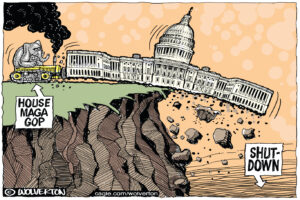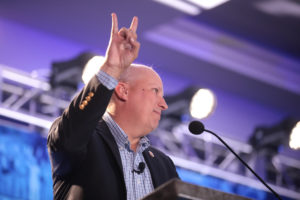For Governors: Responsibility Equals Invisibility
If you want to get national attention as a governor these days, don't try to be innovative about solving the problems you were elected to deal with.If you want to get national attention as a governor these days, don’t try to be innovative about solving the problems you were elected to deal with — in education, transportation and health care. No, if you want ink and television time, just cut and cut and cut some more.
Almost no one in the national media is noticing governors who say the reasonable thing: that state budget deficits, caused largely by drops in revenue in the economic downturn, can’t be solved by cuts or tax increases alone.
There is nothing courageous about an ideological governor hacking away at programs that partisans of his philosophy, including campaign contributors, want eliminated. That’s staying in your comfort zone.
The brave ones are such as Jerry Brown in California, Dan Malloy in Connecticut, Pat Quinn in Illinois, Mark Dayton in Minnesota and Neil Abercrombie in Hawaii. They are declaring that you have to cut programs, even when your own side likes them, and raise taxes, which nobody likes much at all. Rhode Island’s Lincoln Chafee has warned of possible tax increases too.
Indeed, to the extent that Quinn received any national press coverage, he got pilloried in conservative outlets in January when he signed tax hikes that included a temporary increase in Illinois’ individual income tax rate from 3 percent to 5 percent.
Despite all the commotion around whether the federal government will shut down, the clamor in the states may be even more important than what’s happening in Washington, which is missing in action on the moment’s most vital fiscal question.
What states are doing to ease their fiscal agonies will only slow down our fragile economic recovery, and may stop it altogether. The last thing we need right now are state and local governments draining jobs and money from the economy, yet that is what they are being forced to do.
As the last three monthly reports from the Bureau of Labor Statistics showed, an economy that created a net 317,000 private-sector jobs lost 70,000 state and local government jobs. Cutbacks are dead weight on the recovery.
In a more rational political climate, President Obama would have resurrected the lovely old Republican idea of federal revenue sharing. Washington should have continued replenishing state budgets for two more years, until we were certain the economic storms had passed. Instead, anything that might be called “stimulus” — “S” is now a scarlet letter in politics — was rejected out of hand.
The federal government could also help the states by picking up more of their Medicaid costs. In the long run, health care spending should be a responsibility of the national government — as it is in almost every other wealthy democracy. A national commitment would end the specter of states forcing already financially beleaguered citizens off the health insurance rolls.
Such ideas are off the table because the current rage is not for figuring out how to make government work better — a cause that once united governors of both parties — but for cutting back even its most basic and popular functions.
Consider the new budget Gov. Scott Walker announced in Wisconsin on Tuesday. Among other things, he proposed cutting state aid to schools by $834 million over the next two years, a 7.9 percent reduction.
On top of that, Walker would make it harder for localities and school districts to make up for the shortfall by limiting their ability to raise property taxes. This isn’t about education reform. It’s about forcing larger class sizes, layoffs, reductions in extracurricular activities or cuts in teacher pay and benefits. But, hey, if it’s labeled “government,” let’s slash it.
What’s truly amazing, as Stateline.org reported recently, is the number of governors who are cutting taxes at the same time they are eviscerating programs. A particularly dramatic case is Florida’s Republican Gov. Rick Scott. He faces a $3.5 billion budget gap — and is pushing for $2 billion in corporate and property tax cuts.
Historically, times of fiscal stress forced states to make useful economies in programs that didn’t work or were not essential. But what’s happening in so many places now is a reckless rush to gut the parts of government that all but the most extreme libertarians support — and that truly deserve to be seen (one thinks of education and programs for poor children) as investments in the future.
And those governors doing the hard work trying to balance cutbacks and tax increases get ignored, because there’s nothing sexy about being responsible.
E.J. Dionne’s e-mail address is ejdionne(at)washpost.com.
© 2011, Washington Post Writers Group
Your support matters…Independent journalism is under threat and overshadowed by heavily funded mainstream media.
You can help level the playing field. Become a member.
Your tax-deductible contribution keeps us digging beneath the headlines to give you thought-provoking, investigative reporting and analysis that unearths what's really happening- without compromise.
Give today to support our courageous, independent journalists.






You need to be a supporter to comment.
There are currently no responses to this article.
Be the first to respond.